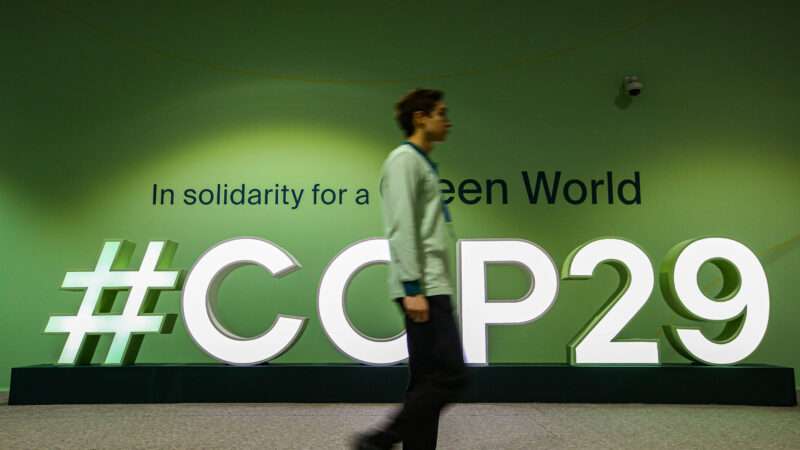
The election of Donald Trump as president has already substantially changed the tenor of the United Nations' 29th annual Climate Change Conference (COP29) that opened today in Baku, Azerbaijan. COP29 is being billed as the "climate finance COP." Actually, all COPs are always regarded as "finance COPs" by poor countries whose chief goal is to extract money from rich countries allegedly to address the problems caused by man-made climate change.
At Baku, the representatives from nearly 200 countries are supposed to agree on a New Collective Quantified Goal for climate finance. In this case, poor countries are demanding that rich countries pay $1 trillion annually in climate finance, up from $100 billion. That sum is supposed to help them adopt non-fossil fuel energy supplies and address the harms caused by climate change.
The incoming Trump administration is not going to pony up any such climate change funding. And few doubt that Trump will again withdraw the United States from the 2015 Paris Climate Change Agreement as he did back in 2017.
Paris Agreement signatories, including the United States for now, aim to hold the increase of the global average temperature to well below 2 degrees Celsius above pre-industrial levels and to pursue efforts to limit the temperature increase to 1.5 degrees Celsius above pre-industrial levels.
As usual, the opening of COP29 was preceded by the annual ritual of a series of alarming new reports declaring that climate trends are still terrible and getting worse. In fact, despite nearly 10 years of U.N. climate negotiations aimed at cutting greenhouse gas emissions under the Paris Agreement, they have increased from 48.8 gigatons in 2015 to a record high of 52.9 gigatons in 2023.
Consequently, the concentrations of planet-warming carbon dioxide rose in the global atmospheric commons to an average of 420 parts per million (ppm) this year. This is up from 399 ppm in 2015 and a 50 percent increase above the pre-industrial average of 280 ppm. In addition, climatologists calculate that 2024 will be the hottest year in the instrumental record and the first year in which global average temperature remains 1.5 degrees Celsius above the pre-industrial baseline.
Meanwhile, U.S. greenhouse gas emissions have been falling and are now 18 percent below their 2005 levels. Concurrently real gross domestic product rose from $16.1 to $23.4 trillion this year. In July, the consultancy Rhodium Group calculated that, under current federal and state policies, the U.S. was on track to reduce its greenhouse emissions by 32 percent to 43 percent in 2030 below their 2005 levels.
Before Trump's election, the independent risk management consultancy DNV issued its Energy Transition Outlook report last month, predicting that global greenhouse gas emissions from energy production will peak in 2024. The DNV report also calculated that "emissions are set to almost halve by 2050, but this is a long way short of requirements of the Paris Agreement. The Outlook forecasts the planet will warm by 2.2 degrees Celsius by end of the century." (For context, the last ice age was about 6 degrees Celsius cooler than now.)
Despite Trump's promises to "drill, baby, drill" and to rescind the climate finance provisions of the Inflation Reduction Act (IRA), it looks likely that U.S. greenhouse gas emissions will not start rising but will instead plateau. As a matter of politics, deep cuts to IRA funding will likely be unpopular since most of its subsidies and tax credits are being spent in Republican congressional districts and states.
On the international front, Paris Agreement signatories are supposed to submit their plans for addressing climate change for the next ten years, called Nationally Determined Contributions (NDC), by this February. The Biden administration had submitted an NDC pledging to cut U.S. net greenhouse gas emissions by 50 percent to 52 percent by below 2005 levels in 2030. A new Harris administration would likely have upped that in February to a 65 percent reduction by 2035. The incoming Trump administration will make no such promises.
The post Trump and Climate Change Policy appeared first on Reason.com.







